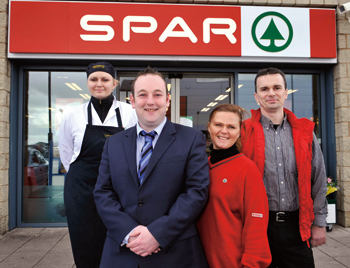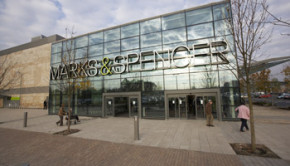Down to business

Store manager at Spar in Eastgate Business Park, Cork, Mark Cantillon and brother Shane boosted trade with stylish seating and a jump from 3,000 to 4,000 sq ft
20 April 2009
What the customer wants, the customer should get.
A phrase that has never rung more true, considering the current economic climate.
However, in Spar Little Island, Cork, there is a slim chance of customers becoming bored with the offering available.
A Tim Hortons sit-down café, Supermacs Express, Kitsu noodle bar, along with the more frequent features of a deli, salad and smoothie bars, are all incorporated into this airy 4,000 sq ft store.
Dashboard dining on the rise
And when your store is based in a business park, with a large percentage of your customers coming from nearby offices on an almost-daily basis for a quick lunch; then such a range of concepts is a prudent move. But as store manager Mark Cantillon asks; "With people watching the pennies, are we reverting back to a situation where they’re looking at price only?" He points out that Lidl is a no-frills store afterall, and yet its sales have risen this year.
In saying this though, he is nevertheless pleased, that together with his brother Shane, he did opt to extend the store in October and include a new sit-down area. The brothers decided this was the way forward after noticing an increase in the ‘dashboard dining’ phenomenon.
"My brother would often come down and he’d see an awful lot of people sitting eating their lunch in their trucks or their car," says Cantillon. However, because he has noticed customers becoming increasingly concerned about price, he is keen to offer as much value as he possibly can. For example, he says, "we’re pushing for a smaller portion of Kitsu noodles. The current portion is €5.99, and it’s very filling, but we’re thinking of maybe a €2.99 portion, to offer value."
Euro-crunching the credit crunch
In his view, retailers should "prepare as if a Lidl was going to open across the road from you." Spar’s Euro-crunch offers, for Cantillon, have therefore proved useful in allowing him to compete, and attract customers away from the discounters and larger multiples.
Spar Euro-crunch offers, he notes, are a "great draw, everyone was talking about them." Although he does concede that customers can sometimes go from offer to offer, and buy little else. In fact, he exclaims; "at one stage a customer bought 75 firelogs in one purchase and nothing else!"
For this reason, he has yet to decide whether he will localise an area of the shop specifically for Euro-crunch, or keep the offers dispersed.
"Special offers on "Real Deal" ends work very well. But sometimes a customer might go past them and go straight for peas and beans, for example. So whereas you could have Spar beans selling for 40 cent on an end, the customer won’t see them unless they’re also where they’d expect to find them. It’s therefore important to have offers both on the Real Deal ends, and shelf-cards throughout the store."
In his drive for value, Cantillon isn’t temped to drive up north however. He explains: "Spar have an extensive range of their own Spar products, which are very aggressively priced. The only companies we deal with outside of central billing is the local scone company or the local bread man, because we need fresh products from this area."
"There is an allowance of 5% to go outside of the system of goods Spar can provide. But other than that, we’d be very loyal and we think that’s important as well. It’s a vicious circle if we go up to Northern Ireland and bring a container of cheap products down here, because we’d be taking employment out of the sector as well."
Sourcing Irish produce
What’s more, working in a store he classifies as, a supermarket within the convenience sector, he accepts that he can’t simply match discounters’ prices.
"It’s fine for somebody to come in, and say, right I was in Lidl or I was in Tesco and I got a product for this price, but they have to think as well, that we’re trying to source most of our products from Ireland."
On the other hand, he adds, "We will respond to what the customer wants. If a customer comes into me and they’re a regular trolley shopper and they say I was in Lidl and I got this, this, and this; you feel obliged, to not match it, but to try and provide something similar. I can’t just go, look, I’m in café business that’s not my problem. I don’t want to start losing customers."
Keeping costs on track
Cantillon is also concerned, like many retailers, to keep business on track, not just by offering customers a greater value proposition, but by keeping costs in line where possible. He admits it can be hard to stay within the store’s wage bill.
But he believes that, particularly in a shop with several concepts, this concern has to be balanced with maintaining service levels. As he points out, "You could go in, in the morning and cut wages 10% if you wanted, but you’re going to have customers walking out the door because they’re not being served. So you have to decide, right, I may be 1% over my wages at the moment, but I’m keeping the customer happy, meaning my footfall’s increasing. There is a thin line between the two though."
The key to managing overheads effectively, he believes however, is in staying on top of every aspect of the business, and not leaving anything to chance. "It’s just a matter of watching everything and making sure that your budgets and your targets are coming in on-line, which we’ve always done."
Applying good housekeeping
These good housekeeping practices apply to the store’s stock control measures too. "I always try to say to staff, if I arrived at your house with a widescreen TV and a new couch, would you just sign me in? But there’s some sort of concept in a shop if someone comes in with a package and the address is on the label, they sign it.
"So we have a simple policy, you go through everything, you tick next to the item on a list; you’ve signed it and you’re sure. You stand over what you’ve signed, and you have to be on top of it, because a case could be missing for all you know. It’s especially important for low margin goods. For example you make 8-9% on a packet of cigarettes, so for every €100 you sell, you make eight or nine euro. So if even one packet out of €100 euro goes missing, you make nothing; that’s how tight it is."
A family affair
His retailing experience is something Cantillon has built up from a young age. "My father was involved in retail all his life, he was in Musgrave’s for 35 years, so I suppose it was kind of in the blood," he notes. "He started as a regional manager and ended up as managing sales director of Musgrave’s for the Centra side of things."
And while Mark was doing a degree in marketing, his brother Shane opened his first shop in Beaumont Drive in Blackrock ten years ago. Mark worked part-time in this store and managed to impress Shane. In fact, when Shane decided to open a second store, he asked Mark onboard. He duly agreed and Spar Little Island was the duo’s third store which they opened three and a half years ago. And despite advice from others in the industry that a greenfields store wouldn’t work out, Mark is glad they decided to forge ahead.
Consolidating trade
The store receives custom not just from the business park; there are approx 3,000 houses in Little Island, and customers also come from Glanmire, a 10 minute drive-away. Says Cantillon, "There are shops like this in business parks that close on a Sunday or would have a half-day on Saturday, but we wouldn’t because it is worth our while to stay open on a Saturday and a Sunday."
This is a positive sign of demand. And while Cantillon notes he is worried about possible changes the Government could implement in terms of changes to cigarette presentation and VAT hikes, he is staying positive. "Our plan for the future is to consolidate, keep everything tight, move forward and get through whatever’s round the corner."



 Print
Print





Fans 0
Followers